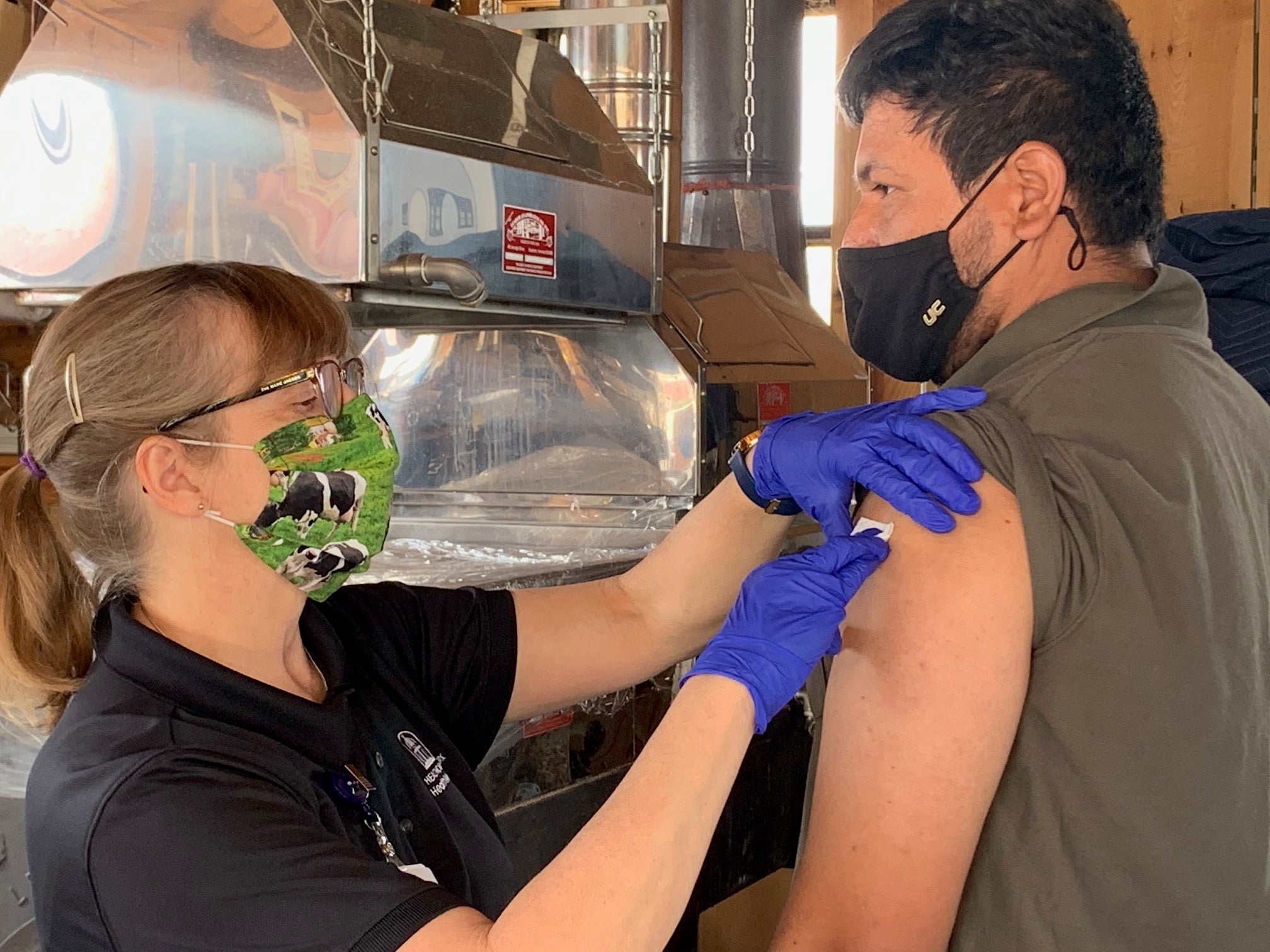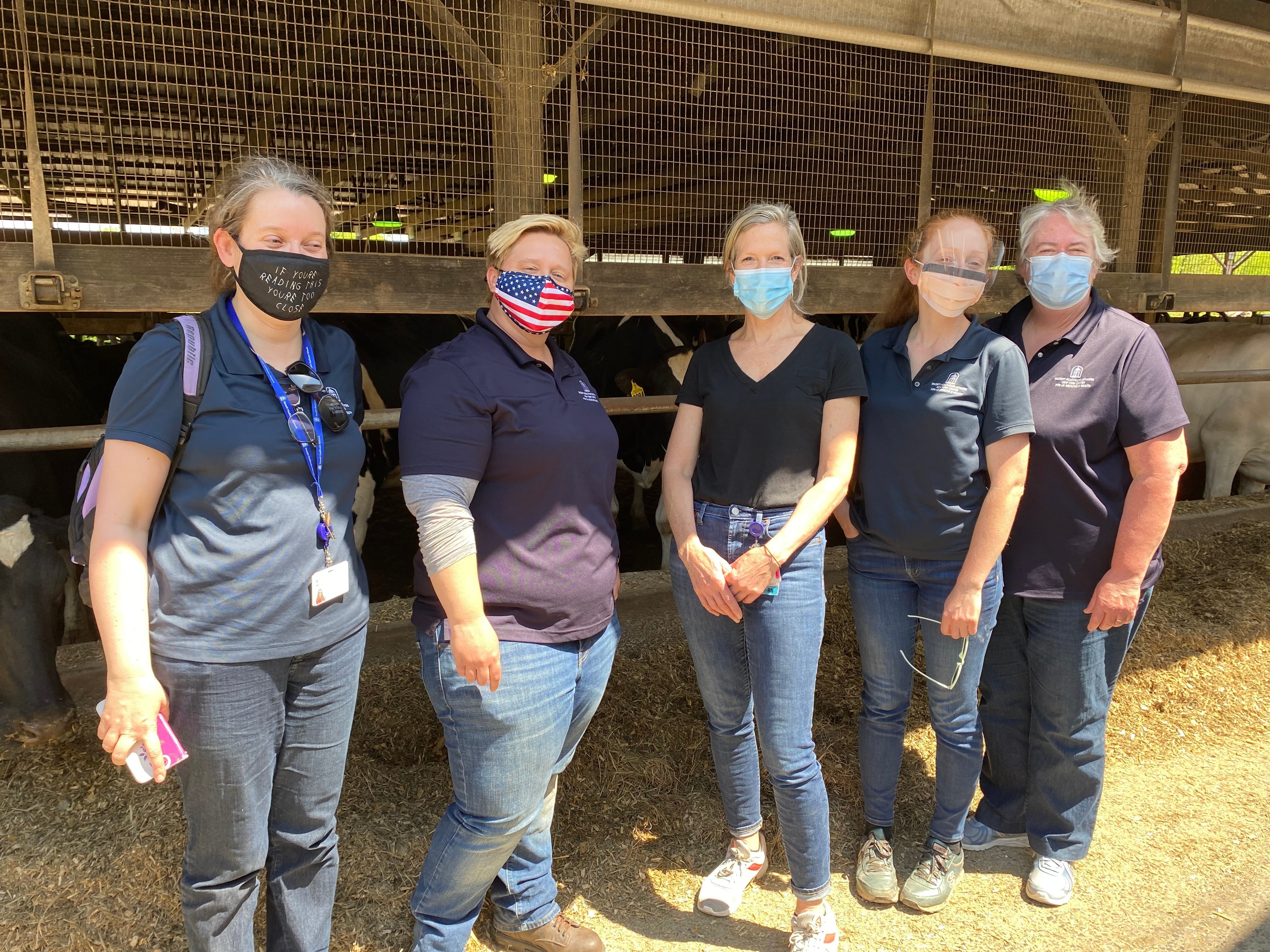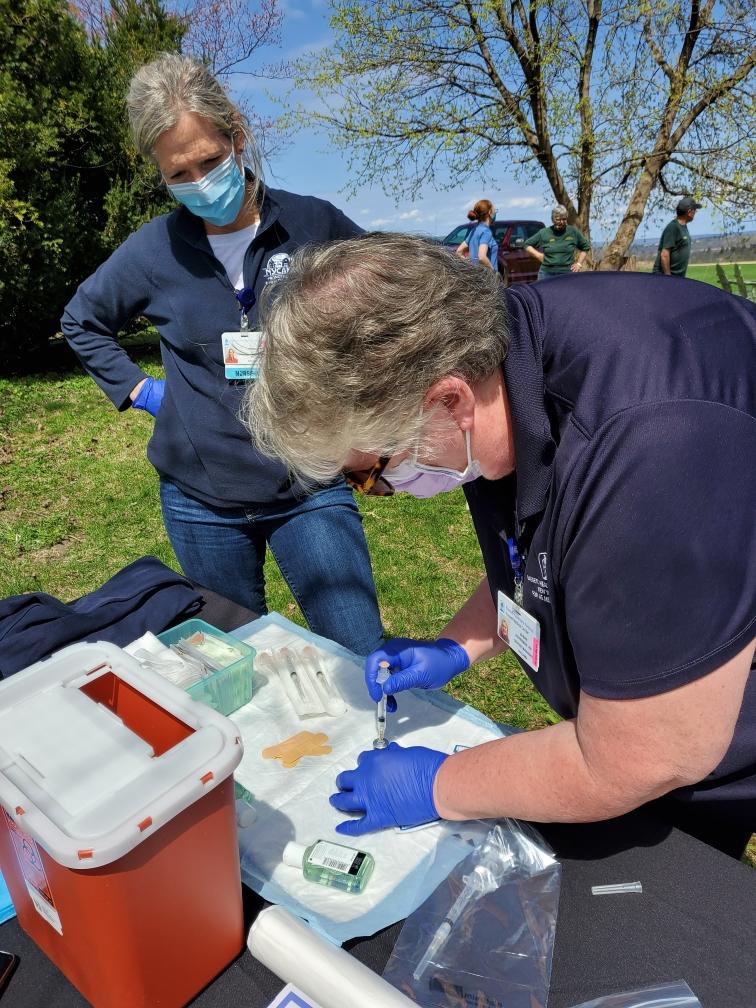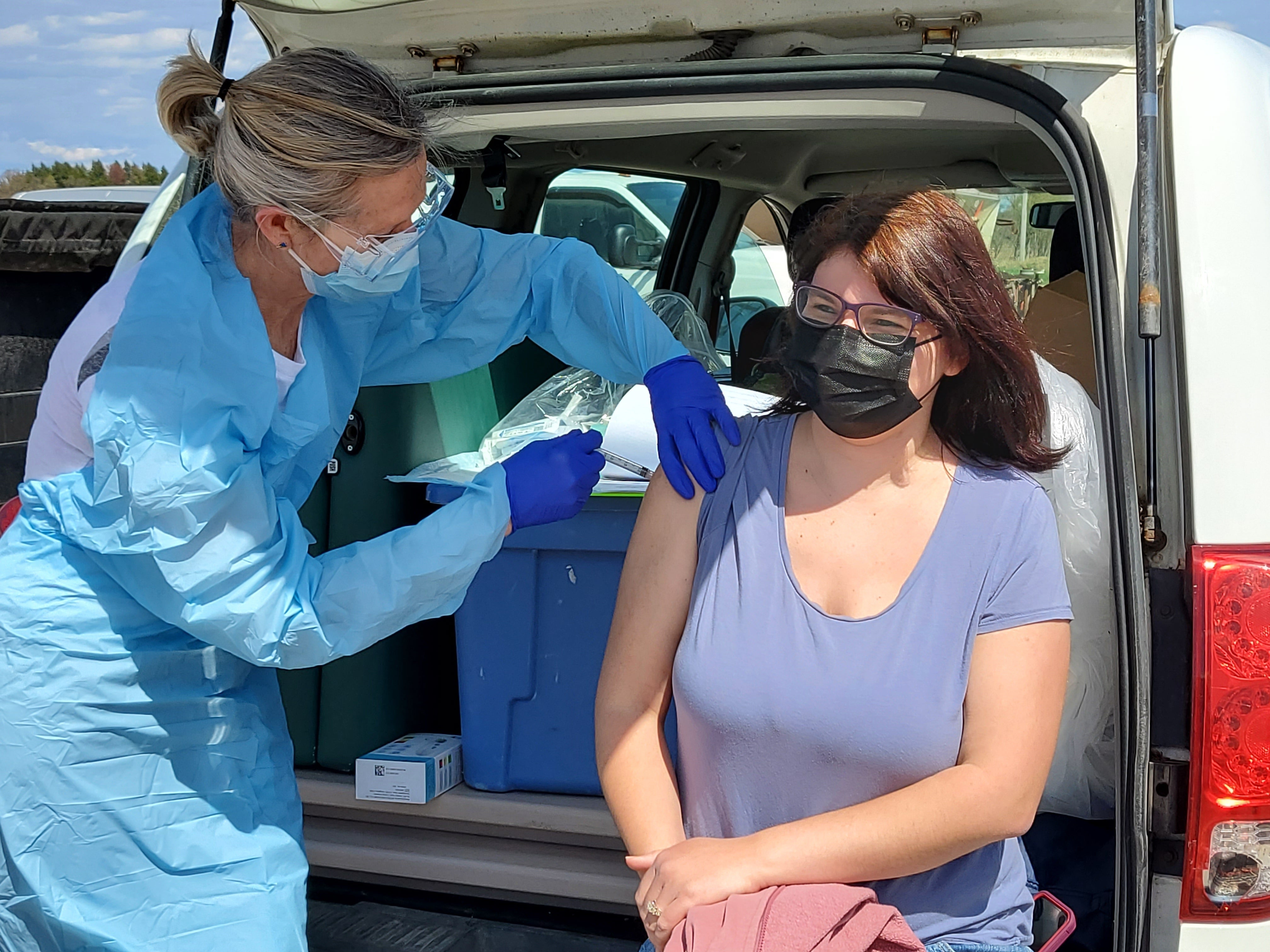Bassett Healthcare Network’s NYCAMH Pioneering Local Efforts to Deliver COVID-19 Vaccines to Farmworkers
July 6, 2021Categories: Bassett News, COVID-19 Resources
Bassett Healthcare Network's New York Center for Agricultural Medicine and Health (NYCAMH) is finding innovative and practical ways to provide COVID-19 vaccinations to Central New York's agricultural community — even if it means setting up a makeshift clinic in a milk house.
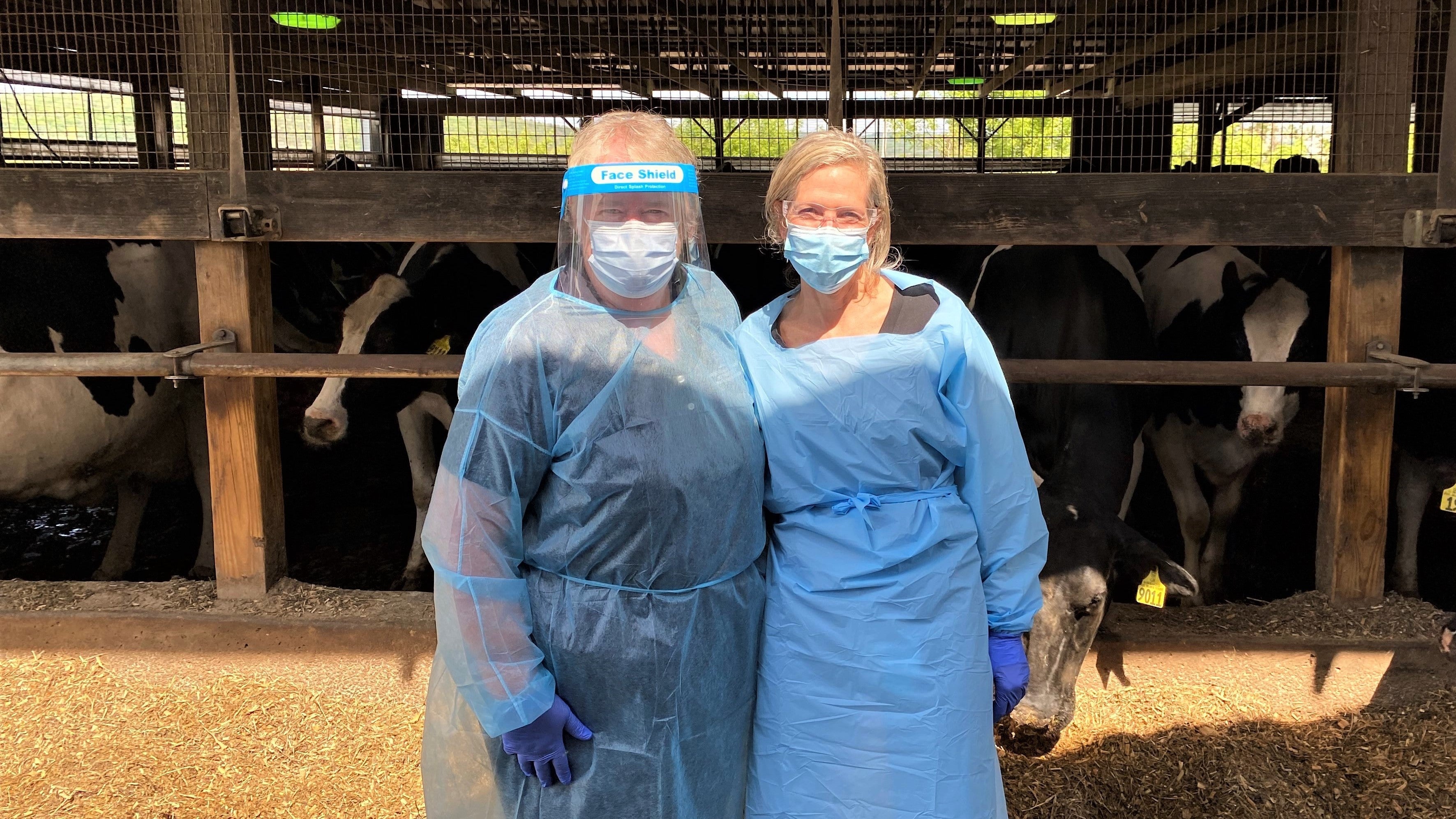
"Working in public health, you prepare for community emergencies through drills," says Nicole Blanchard, DrPH, MPH, data systems administrator at NYCAMH. "These drills are typically held in big open spaces — a gymnasium or a parking lot — because that's where you expect to set up something like a vaccination site. But we've had to set up in just about any corner of a farm you can imagine. On one freezing cold and snowy day, we were jammed into a 10 feet by 10 feet space in the back of a milk house. Another day we were in the back of a barn with people working on tractors and cows wandering by. We can plan, but you can only prepare for so much."
NYCAMH is a robust, interdisciplinary, "boots-on-the-ground" institution dedicated to the health and well-being of New York State's agricultural community. Nurses Judy Graham and Sue Ackerman have regularly teamed up for local flu vaccination clinics, but delivering COVID-19 vaccinations to farmworkers posed a completely new challenge this spring.
"You just have to be really flexible," explains Blanchard. "And be willing to ruin a few pairs of shoes along the way."
Meeting Practical Needs
NYCAMH chose to create mobile, on-site clinics to best accommodate the unique needs of local farms.
"Most farmers and farmworkers only became eligible for the vaccine in March and April," explains NYCAMH's director, Julie Sorensen, PhD. "Many farmers work 14 hours a day, 7 days a week in the spring. It is the worst time to ask them to leave the farm to visit a vaccination site."
There's also the question of transportation. Most of the immigrant dairy workers do not have personal vehicles. "Transporting 40 or 50 workers in vans across the county would only make their risk of COVID infection worse," says Sorensen.
Bringing vaccination to the farms addresses these needs, but it also introduces new challenges. For example, farms need constant work coverage, which can make vaccinating all members of a worksite at once problematic.
"Cows need to be milked every day," says Sorensen. "If somebody's sick, somebody else needs to fill in. Farms — especially smaller farms with smaller teams of workers — can't afford to have everyone sick with side effects at once." Kathy Smith, LMSW, Clinical Case Manager at NYCAMH, made sure to stagger second dose clinics with farms in order to mitigate that risk.
However, staggered distribution exacerbates another problem. The Moderna vaccine vials usually hold 10 doses. Once a vial is opened, the doses need to be used before they expire. To avoid waste, NYCAMH schedules with multiple farms on a single day to ensure they come close to even batches of 10.
Thankfully, farms have been enthusiastic partners with NYCAMH in these efforts to make everyone safer.
"Farmers have been extremely positive and very grateful. As soon as we open the doors, everyone is lined up and ready to go," says Blanchard.
Meeting Personal Needs
Remote locations, full schedules, and demanding work are the practical challenges of farming. In addition, there are personal barriers faced by the farmworkers themselves.
To address language barriers, vaccination clinic teams include bilingual staff members Cristina S. Hansen Ruiz, PhD, Dahlia Sheehan-Yassin, and Anna Meyerhoff. Their work is often more complex than simple English-Spanish interpretation.
Many agricultural workers are from southern Mexico or Guatemala where an indigenous language is their primary language—Spanish is secondary. In addition, without the opportunity for schooling, many workers struggle to read and write in Spanish. All these make the large crowds and complex instructions of mass vaccination sites daunting.
"Handing folks a registration form to fill out can be overwhelming for them," explains Meyerhoff, NYCAMH's senior bilingual agricultural safety and education coordinator. Meyerhoff, Ruiz and Sheehan-Yassin explain the vaccine, prepare workers for possible side effects, and read through the state forms with personalized attention. "It's much less intimidating to be in a farm environment with other Spanish speakers and people they know."
And then there are anxieties about the vaccines common to migrant and domestic farmworkers alike.
"There's been some hesitancy," says Meyerhoff. "People may be worried about side effects. Others are afraid of needles, and some just are not used to getting vaccines in general. So we explain why we know that it is safe, go through all the secondary effects, how to take care of yourself if you experience them, and then let them decide."
Going Forward
Nearly 200 workers have been vaccinated at Bassett Healthcare Network NYCAMH on-farm clinics, and NYCAMH plans to continue as long as they are needed — which may be a while since new workers travel to the area at different times to tend to crops across seasons.
"These vaccination clinics are an opportunity to leverage our great relationships with local farms and workers in our community," says Blanchard. "Our unique position allows us to reach people the big sites can't."
"We're just doing one little bit of the much bigger effort. But these are the people who work hard to feed the rest of us. They are as essential and important as anyone," says Meyerhoff.
A program of Bassett Healthcare Network, NYCAMH'S mission is to enhance agricultural and rural health by preventing and treating occupational injury and illness. Learn more at www.nycamh.org.
